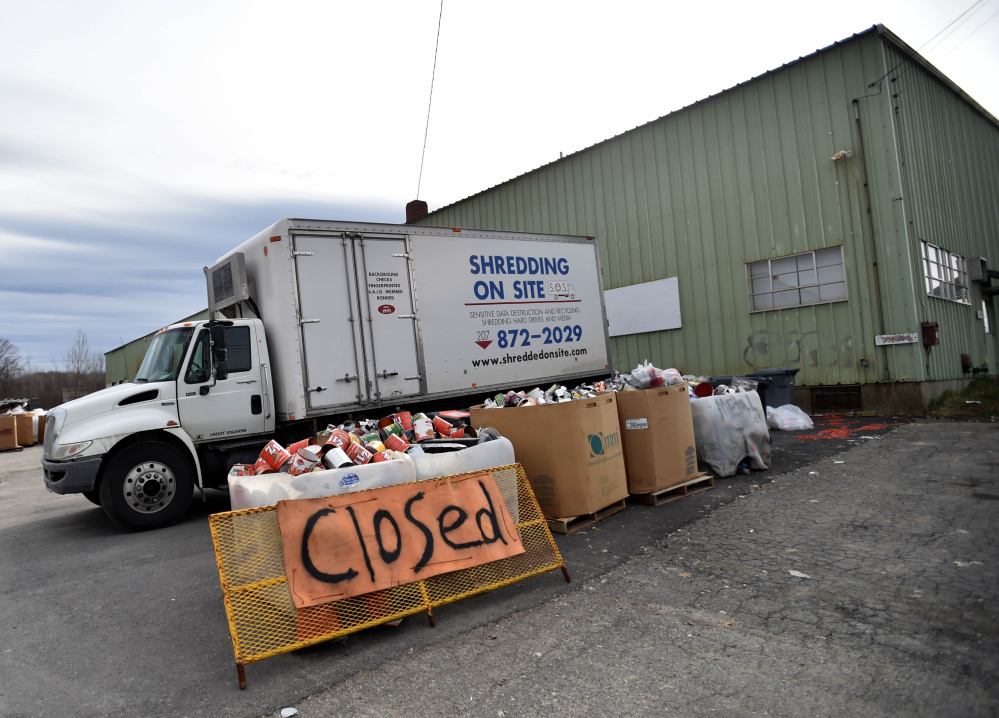WATERVILLE — A pilot program sponsored by the city and local activists aims to get kitchen scraps and other organic waste out of the trash Waterville pays to transport and dispose of, and save residents money in garbage bag fees.
Starting this month, residents can take their cast-off organic waste to composting totes at Shredding On Site, a paper recycling company on Armory Road.
The totes will be collected by Agri-Cycle, a compost transportation company affiliated with Exeter Agri-Energy, an anaerobic digester in Exeter that produces electricity, fuel and compost from organic waste.
Some people have wanted a residential compost project for years, but the city is starting the project now, as it decides where it is going to send its municipal trash, said Todd Martin, a member of the city’s solid waste committee.
Waterville ships its waste to an electricity-producing incinerator, Penobscot Energy Recovery Co. in Orrington, but its contract with the company expires in 2018. City officials are considering a number of options for where to send its trash after that, including a new biogas plant in Hampden, a landfill in Norridgewock or an incinerator in Portland.
“No matter where we end up sending our solid waste, we want to reduce the amount of trash as much as we can, and organics is the easiest way to do that,” Martin said.
The three-month pilot project was developed by the committee and the Sustain Mid Maine Coalition, a group aimed promoting environmental sustainability in the Waterville area.
Stu Silverstein, a proponent of the program, said he’d like to see it expand after the first three months and ideally would like to see a private entrepreneur offer curbside compost pickup.
“We’re talking about a very little money. It is a pilot program designed to bring awareness to the community,” Silverstein said. “I like to work for a better environment for all of us, I think it is an important thing everyone can take part in.”
Residents can collect food scraps such as fruit, vegetable, meat and fish scraps, coffee grounds, eggshells, dairy products and bread, as well as napkins and paper towels, and bring them to the totes at Shredding on Site during business hours. People can even leave their compostables in plastic bags, according to Sustain Mid Maine.
Ag-Cycle Energy, the transport wing of the Exeter energy plant, already collects organics from Colby and Thomas colleges and Hannaford supermarkets in Waterville, and is edging into the residential market.
Greg Williams, from Agri-Cycle, said the Exeter plant produces about 1 megawatt of electricity and mostly processes cow manure collected from Stonyvale Farm in Exeter, which is one of the largest dairy farms in the state. But the plant is permitted to produce up to 3 megawatts of electricity, and the company sees municipal organic waste as a way to grow, Williams said.
Agri-Energy has a pilot project in Waterville, is starting another for Greenville and Dexter in May, and is in discussion with other communities, according to Williams. It is basing its collection network around 40 Hannaford supermarkets in the state it collects from. The company also works with commercial clients in Massachusetts, New Hampshire and Vermont.
Considering the amount of waste people throw away that could be composted instead, it isn’t a surprise the company is looking at residential waste as a potential material source for its plant.
A 2011 study by the University of Maine School of Economics estimated that more than 38 percent of the trash Maine residents threw away could be composted instead. Private companies such as Garbage to Garden and We Compost It! are breaking into the municipal market in southern Maine communities by providing curbside pickup services for food and organic waste.
If the city could reduce the amount of compostable material being sent out as waste, Waterville could limit the amount it has to pay to transport and dispose of its trash at the PERC incinerator in Orrington, or another location. The city pays a $76 per ton tipping fee at PERC, which is reduced to $59 a ton after rebates. Future options range from around $60 a ton to more than $80 per ton.
In comparison, it will cost communities $40 a ton to dispose of organics at Exeter Agri-Energy, according to Williams.
“It’s less than the other options. That’s one of the attractive aspects of this,” he said.
Breaking out organics from other waste is attractive from a pocketbook perspective for Waterville residents. The less trash they generate, the fewer trash bags they’ll have to buy as part of the city’s pay per throw trash system.
“To me, success is really just educating people that you don’t have to throw away your kitchen scraps. You can save money if you compost it instead,” Martin said.
Peter McGuire — 861-9239
Copy the Story LinkSend questions/comments to the editors.




Success. Please wait for the page to reload. If the page does not reload within 5 seconds, please refresh the page.
Enter your email and password to access comments.
Hi, to comment on stories you must . This profile is in addition to your subscription and website login.
Already have a commenting profile? .
Invalid username/password.
Please check your email to confirm and complete your registration.
Only subscribers are eligible to post comments. Please subscribe or login first for digital access. Here’s why.
Use the form below to reset your password. When you've submitted your account email, we will send an email with a reset code.